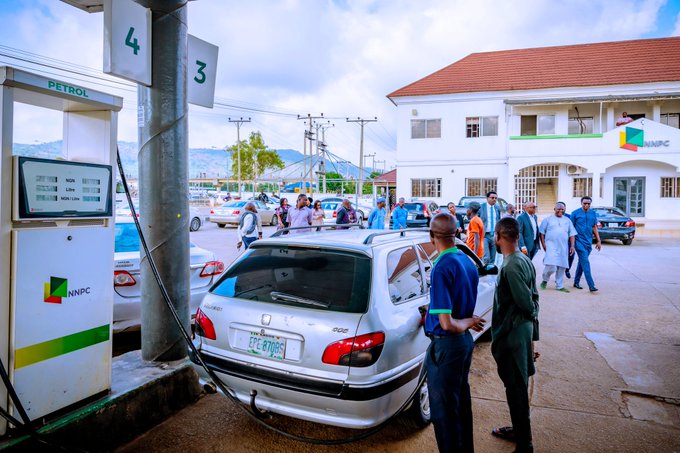Nigeria’s petrol consumption has taken a massive hit since President Bola Tinubu assumed office.
In just one year, daily fuel consumption has dropped by 92%, according to a report from the Nigerian Midstream and Downstream Product Regulatory Authority (NMDPRA).
The report shows that Nigeria now consumes only 4.5 million litres of petrol daily, a shocking reduction from 60 million litres per day in May 2023.
This drastic decrease has sent shockwaves through the nation as fuel shortages, high prices, and inflation continue to burden Nigerians.
One of the key reasons for this plunge in fuel consumption is President Tinubu’s decision to end the petrol subsidy.
On May 29, 2023, Tinubu announced that the government could no longer afford to spend billions of naira on subsidizing petrol.
This announcement marked the end of a policy that had cost Nigeria a staggering N12 trillion over the past decade.
The immediate effect was felt at the pumps, where petrol prices skyrocketed from N195 per litre to around N1,300 per litre in some states.
As the prices soared, many Nigerians were forced to cut back on fuel consumption or seek alternatives to cope with the new reality.
The removal of the petrol subsidy has had far-reaching consequences beyond the fuel stations.
It triggered a wave of inflation that saw prices of goods and services skyrocket across the country.
By June 2024, inflation hit an alarming 34.19%, the highest Nigeria had seen in nearly 30 years.
Although inflation slowed slightly to 32.7% by September, the damage was already done.
The rising cost of living plunged millions of Nigerians deeper into poverty.
The World Bank reported that 129 million Nigerians, or 56% of the population, now live below the poverty line.
This marks a significant jump from 40% in 2018.
According to the World Bank, this increase in poverty is partly due to the slow pace of economic growth, which has failed to keep up with rising inflation and population growth.
Another troubling aspect of the fuel crisis is the uneven distribution of petrol across Nigeria.
Out of the 36 states in the country, only 16 received any petrol allocation in August 2024.
States like Niger, Lagos, and Kaduna received the highest allocations, while others, such as Sokoto, Ogun, and Gombe, received only a few trucks of petrol for the entire month.
Many states received no allocation at all, leading to severe fuel shortages and long queues at petrol stations.
In the worst-hit areas, people have had to endure long waits and pay exorbitant prices for the limited fuel available.
The steep rise in petrol prices has forced many Nigerians to make tough decisions.
For some, that means giving up their cars altogether.
When President Tinubu took office, he promised economic reforms that would transform Nigeria’s struggling economy.
One of the first steps in this transformation was the removal of the fuel subsidy, which had long been a drain on the nation’s finances.
While the move was praised by some economists as necessary for Nigeria’s long-term stability, the immediate effects have been devastating for ordinary Nigerians.
Food prices have soared, public transport costs have risen, and many households now struggle to afford basic necessities.
The economic crisis is particularly severe in areas like Jibia, a border town that once thrived on trade with Niger.
Since the closure of the border and the fuel price hike, food prices in Jibia have exploded, leaving many residents struggling to make ends meet.
The removal of the petrol subsidy is only one part of Tinubu’s broader economic reforms.
However, the consequences of these reforms are being felt across all sectors of the economy.
The price of basic goods has skyrocketed, and the devaluation of the naira has made imports more expensive.
Nigerians are facing some of the toughest economic conditions in decades.

